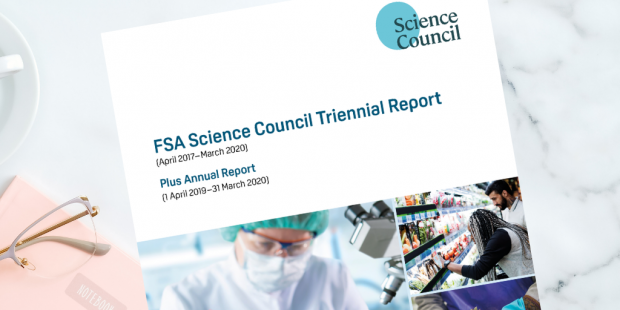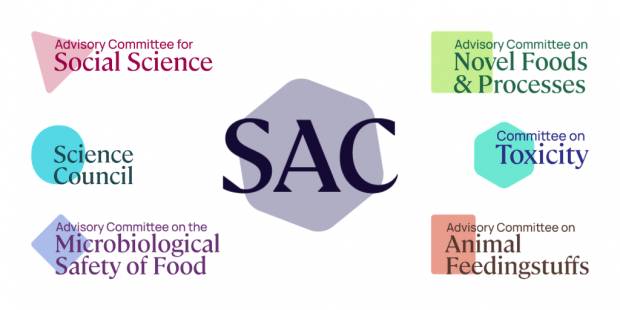
As the Science Council publishes its three-year review, our Chief Scientific Adviser Professor Robin May reflects on how the council’s insight has made a difference to our work. The Science Council's Triennial Report can be accessed online.
Throughout the Food Standards Agency’s 20-year history, our commitment to science and evidence has underpinned all of our policy-making. As we look towards the next 20 years, one of the biggest changes for us is operating outside the EU, which brings with it an enormous increase in the science demanded by and from the FSA.
My role as Chief Scientific Adviser is to provide expert scientific advice to the UK government and to help decision-makers use science to shape the future of food safety. Our scientific advice is a genuine team effort, drawing on the diverse expertise within the FSA science directorate as well as the views of the many independent experts who serve on our network of Scientific Advisory Committees.

The Science Council is one of those committees. Its role is to provide the FSA Board and executive team with independent strategic insight, challenge and advice on our use of science to deliver our objectives.
The Science Council has just published its first three-year review and it makes for impressive reading. Thanks to their recommendations, we have expanded our internal science capability and leadership and built stronger relationships with research funding partners. We’ve set up ‘agile’ systems to support rapid evidence gathering; something that is critical to our role as a food regulator and which proved invaluable in helping us gather insights in response to COVID-19.
The Science Council have considered how we establish and communicate risk and uncertainty, developing 15 key principles of best practice. These now underpin our newly reformed risk analysis process, a critical function that we have developed and expanded in order to assess food safety risk and provide risk management advice to Ministers now that we have left the EU.
More recently, the Council has been providing invaluable suggestions about how we can be alert to future changes in global food systems risks and opportunities. It made five recommendations for improved long-term horizon scanning, in response to which we have now established a dedicated team in this area. The lessons from this review have already been utilised in guiding our thinking about future changes to the food system as a result of the COVID-19 pandemic.
The work of the Science Council, like all our science committees, is available for anyone who has an interest in what we do. It holds open meetings and publishes its own reports on its own website.
My thanks go to all of our Science Council members and, in particular, to Professor Sandy Thomas who, as Chair, has ably guided the council through its formative years. The ability to tap into the remarkable collective expertise of Science Council is something I value enormously, and I very much look forward to continuing this strong relationship in the years to come.
Read the full Science Council Triennial Report.
Wrth i'r Cyngor Gwyddoniaeth gyhoeddi ei adolygiad tair blynedd, mae ein Prif Gynghorydd Gwyddonol, yr Athro Robin May, yn trafod sut mae mewnwelediad (insight) y cyngor wedi gwneud gwahaniaeth i'n gwaith. Gallwch chi ddarllen yr adolygiad ar-lein.
Yn hanes 20 mlynedd yr Asiantaeth Safonau Bwyd (ASB), mae ein hymrwymiad i wyddoniaeth a thystiolaeth wedi bod yn sail i'n holl waith yn llunio polisïau. Wrth i ni edrych tuag at yr 20 mlynedd nesaf, un o'r newidiadau mwyaf i ni yw gweithredu y tu allan i'r Undeb Ewropeaidd (UE), sy'n golygu cynnydd aruthrol yn y wyddoniaeth sydd ei hangen ar yr ASB, a chanddi.
Fy ngwaith i fel Prif Gynghorydd Gwyddonol yw rhannu cyngor gwyddonol arbenigol i lywodraeth y Deyrnas Unedig (DU) a helpu'r rhai sy'n gwneud penderfyniadau i ddefnyddio gwyddoniaeth i lunio dyfodol diogelwch bwyd. Mae ein cyngor gwyddonol yn ymdrech tîm wirioneddol, gan dynnu ar yr arbenigedd amrywiol o fewn cyfarwyddiaeth wyddoniaeth yr ASB yn ogystal â barn y llu o arbenigwyr annibynnol sy'n gwasanaethu ar ein rhwydwaith o bwyllgorau cynghori gwyddonol.

Mae'r Cyngor Gwyddoniaeth yn un o'r pwyllgorau hynny. Ei rôl yw rhoi mewnwelediad, her a chyngor strategol annibynnol i Fwrdd a thîm gweithredol yr ASB ar ein defnydd o wyddoniaeth i gyflawni ein hamcanion.
Mae'r Cyngor Gwyddoniaeth newydd gyhoeddi ei adolygiad tair blynedd cyntaf, ac mae'n adolygiad hynod ddiddorol. Diolch i argymhellion y pwyllgorau cynghori gwyddonol, rydym ni wedi ehangu ein gallu a'n harweinyddiaeth wyddoniaeth fewnol ac wedi meithrin perthnasoedd cryfach â phartneriaid cyllido ymchwil. Rydym ni wedi sefydlu systemau 'ystwyth' i gefnogi casglu tystiolaeth yn gyflym; rhywbeth sy'n hanfodol i'n rôl fel rheoleiddiwr bwyd ac a brofodd yn amhrisiadwy wrth ein helpu i gasglu mewnwelediadau mewn ymateb i COVID-19.
Mae'r Cyngor Gwyddoniaeth wedi ystyried sut rydym ni’n sefydlu ac yn cyfathrebu risg ac ansicrwydd, gan ddatblygu 15 prif egwyddor arfer gorau. Mae'r rhain bellach yn sail i'n proses dadansoddi risg sydd newydd ei diwygio, proses hanfodol rydym ni wedi'i datblygu a'i hehangu er mwyn asesu risg diogelwch bwyd a darparu cyngor ar reoli risg i Weinidogion, nawr ein bod wedi ymadael â’r UE.
Yn fwy diweddar, mae'r Cyngor wedi bod yn cynnig awgrymiadau amhrisiadwy o ran sut y gallwn ni fod yn effro i newidiadau yn y dyfodol o ran risgiau a chyfleoedd systemau bwyd byd-eang. Gwnaeth bum argymhelliad ar gyfer gwella ein gallu sganio’r gorwel tymor yn y tymor hir, ac mewn ymateb i hyn, rydym ni bellach wedi sefydlu tîm ymroddedig yn y maes hwn. Mae'r gwersi o'r adolygiad hwn eisoes wedi'u defnyddio i lywio ein hystyriaethau o ran newidiadau i'r system fwyd yn y dyfodol o ganlyniad i bandemig COVID-19.
Mae gwaith y Cyngor Gwyddoniaeth, fel ein holl bwyllgorau gwyddoniaeth, ar gael i unrhyw un sydd â diddordeb yn yr hyn rydym ni'n ei wneud. Mae’r holl gyfarfodydd yn agored ac mae’r adroddiadau yn cael eu cyhoeddi ar wefan y Cyngor.
Hoffwn ddiolch i bob un o aelodau ein Cyngor Gwyddoniaeth ac, yn benodol, i'r Athro Sandy Thomas sydd, fel Cadeirydd, wedi arwain y cyngor yn fedrus trwy ei flynyddoedd cyntaf. Mae'r gallu i fanteisio ar arbenigedd cyfunol arbennig y Cyngor Gwyddoniaeth yn rhywbeth rwy’n ei werthfawrogi’n fawr, a dwi’n edrych ymlaen yn fawr at barhau â'r perthynas gref hon yn y blynyddoedd i ddod.
Leave a comment